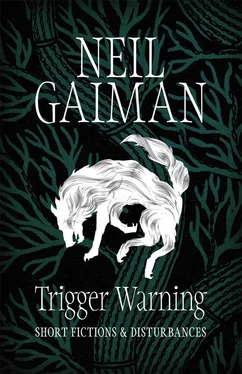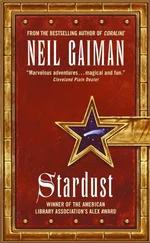Neil Gaiman - Trigger Warning - Short Fictions and Disturbances
Здесь есть возможность читать онлайн «Neil Gaiman - Trigger Warning - Short Fictions and Disturbances» весь текст электронной книги совершенно бесплатно (целиком полную версию без сокращений). В некоторых случаях можно слушать аудио, скачать через торрент в формате fb2 и присутствует краткое содержание. Год выпуска: 2015, Издательство: Headline, Жанр: Старинная литература, на английском языке. Описание произведения, (предисловие) а так же отзывы посетителей доступны на портале библиотеки ЛибКат.
- Название:Trigger Warning: Short Fictions and Disturbances
- Автор:
- Издательство:Headline
- Жанр:
- Год:2015
- ISBN:нет данных
- Рейтинг книги:4 / 5. Голосов: 1
-
Избранное:Добавить в избранное
- Отзывы:
-
Ваша оценка:
- 80
- 1
- 2
- 3
- 4
- 5
Trigger Warning: Short Fictions and Disturbances: краткое содержание, описание и аннотация
Предлагаем к чтению аннотацию, описание, краткое содержание или предисловие (зависит от того, что написал сам автор книги «Trigger Warning: Short Fictions and Disturbances»). Если вы не нашли необходимую информацию о книге — напишите в комментариях, мы постараемся отыскать её.
Trigger Warning: Short Fictions and Disturbances — читать онлайн бесплатно полную книгу (весь текст) целиком
Ниже представлен текст книги, разбитый по страницам. Система сохранения места последней прочитанной страницы, позволяет с удобством читать онлайн бесплатно книгу «Trigger Warning: Short Fictions and Disturbances», без необходимости каждый раз заново искать на чём Вы остановились. Поставьте закладку, и сможете в любой момент перейти на страницу, на которой закончили чтение.
Интервал:
Закладка:
‘You also can’t expect us actually to believe any of this,’ said someone, and I think it was Jocelyn.
‘Right,’ said Brian. ‘I mean, next thing you’ll be telling us that you uninvented the spaceship.’
‘But I did,’ said Obediah Polkinghorn. He seemed extremely pleased with himself. ‘Twice. I had to. You see, the moment we whizz off into space and head out to the planets and beyond, we bump into things that spur so many other inventions. The Polaroid Instant Transporter. That was the worst. And the Mockett Telepathic Translator. That was the worst as well. But as long as it’s nothing worse than a rocket to the moon, I can keep everything under control.’
‘So, how exactly do you go about uninventing things?’ I asked.
‘It’s hard,’ he admitted. ‘It’s all about unpicking probability threads from the fabric of creation. Which is a bit like unpicking a needle from a haystack. But they tend to be long and tangled, like spaghetti. So it’s rather like having to unpick a strand of spaghetti from a haystack.’
‘Sounds like thirsty work,’ said Michael, and I signalled him to pour me another half pint of cider.
‘Fiddly,’ said the little man. ‘Yes. But I pride myself on doing good. Each day I wake, and, even if I’ve unhappened something that might have been wonderful, I think, Obediah Polkinghorn, the world is a happier place because of something that you’ve uninvented.’
He looked into his remaining scotch, swirled the liquid around in his glass.
‘The trouble is,’ he said, ‘with the Wispamuzak gone, that’s it. I’m done. It’s all been uninvented. There are no more horizons left to undiscover, no more mountains left to unclimb.’
‘Nuclear power?’ suggested ‘Tweet’ Peston.
‘Before my time,’ said Obediah. ‘Can’t uninvent things invented before I was born. Otherwise I might uninvent something that would have led to my birth, and then where would we be?’ Nobody had any suggestions. ‘Knee-high in jet-packs and flying cars, that’s where,’ he told us. ‘Not to mention Morrison’s Martian Emolument.’ For a moment, he looked quite grim. ‘Ooh. That stuff was nasty. And a cure for cancer. But frankly, given what it did to the oceans, I’d rather have the cancer.
‘No. I have uninvented everything that was on my list. I shall go home,’ said Obediah Polkinghorn, bravely, ‘and weep, like Alexander, because there are no more worlds to unconquer. What is there left to uninvent?’
There was silence in the Fountain.
In the silence, Brian’s iPhone rang. His ringtone was the Rutles singing ‘Cheese and Onions’. ‘Yeah?’ he said. Then, ‘I’ll call you back.’
It is unfortunate that the pulling out of one phone can have such an effect on other people around. Sometimes I think it’s because we remember when we could smoke in pubs, and that we pull out our phones together as once we pulled out our cigarette packets. But probably it’s because we’re easily bored.
Whatever the reason, the phones came out.
Crown Baker took a photo of us all, and then Twitpicced it. Jocelyn started to read her text messages. ‘Tweet’ Peston tweeted that he was in the Fountain and had met his first uninventor. Professor Mackintosh checked the test match scores, told us what they were and emailed his brother in Inverness to grumble about them. The phones were out and the conversation was over.
‘What’s that?’ asked Obediah Polkinghorn.
‘It’s the iPhone 5,’ said Ray Arnold, holding his up. ‘Crown’s using the Nexus X. That’s the Android system. Phones. Internet. Camera. Music. But it’s the apps. I mean, do you know, there are over a thousand fart sound-effect apps on the iPhone alone? You want to hear the unofficial Simpsons Fart App?’
‘No,’ said Obediah. ‘I most definitely do not want to. I do not .’ He put down his drink, unfinished. Pulled his tie up. Did up his coat. ‘It’s not going to be easy,’ he said, as if to himself. ‘But, for the good of all . . .’ And then he stopped. And he grinned.
‘It’s been marvellous talking to you all,’ he announced to nobody in particular, as he left the Fountain.
Nothing O’Clock
I
The Time Lords built a prison. They built it in a time and place that are equally as unimaginable to any entity who has never left the solar system in which it was spawned, or who has only experienced the journey into the future one second at a time, and that going forward. It was built solely for the Kin. It was impregnable: a complex of small, nicely appointed rooms (for they were not monsters, the Time Lords. They could be merciful, when it suited them), out of temporal phase with the rest of the Universe.
There were, in that place, only those rooms: the gulf between microseconds was one that could not be crossed. In effect, those rooms became a Universe in themselves, one that borrowed light and heat and gravity from the rest of creation, always a fraction of a moment away.
The Kin prowled its rooms, patient and deathless, and always waiting.
It was waiting for a question. It could wait until the end of time. (But even then, when Time Ended, the Kin would never perceive it, imprisoned in the micro-moment away from time.)
The Time Lords maintained the prison with huge engines they built in the hearts of black holes, unreachable: no one would be able to get to the engines, save the Time Lords themselves. The multiple engines were a fail-safe. Nothing could ever go wrong.
As long as the Time Lords existed, the Kin would be in their prison, and the rest of the Universe would be safe. That was how it was, and how it always would be.
And if anything went wrong, then the Time Lords would know. Even if, unthinkably, any of the engines failed, then emergency signals would sound on Gallifrey long before the prison of the Kin returned to our time and our Universe. The Time Lords had planned for everything.
They had planned for everything except the possibility that one day there would be no Time Lords, and no Gallifrey. No Time Lords in the Universe, except for one.
So when the prison shook and crashed, as if in an earthquake, throwing the Kin down, and when the Kin looked up from its prison to see the light of galaxies and suns above it, unmediated and unfiltered, and it knew that it had returned to the Universe, it knew it would only be a matter of time until the question would be asked once more.
And, because the Kin was careful, it took stock of the Universe they found themselves in. It did not think of revenge: that was not in its nature. It wanted what it had always wanted. And besides . . .
There was still a Time Lord in the Universe.
The Kin needed to do something about that.
II
On Wednesday, eleven-year-old Polly Browning put her head around her father’s office door. ‘Dad. There’s a man at the front door in a rabbit mask who says he wants to buy the house.’
‘Don’t be silly, Polly.’ Mr Browning was sitting in the corner of the room he liked to call his office, and which the estate agent had optimistically listed as a third bedroom, although it was scarcely big enough for a filing cabinet and a card table, upon which rested a brand-new Amstrad computer. Mr Browning was carefully entering the numbers from a pile of receipts onto the computer, and wincing. Every half an hour he would save the work he’d done so far, and the computer would make a grinding noise for a few minutes as it saved everything onto a floppy disk.
‘I’m not being silly. He says he’ll give you seven hundred and fifty thousand pounds for it.’
‘Now you’re really being silly. It’s on sale for a hundred and fifty thousand.’ And we’d be lucky to get that in today’s market, he thought, but did not say. It was the summer of 1984, and Mr Browning despaired of finding a buyer for the little house at the end of Claversham Row.
Читать дальшеИнтервал:
Закладка:
Похожие книги на «Trigger Warning: Short Fictions and Disturbances»
Представляем Вашему вниманию похожие книги на «Trigger Warning: Short Fictions and Disturbances» списком для выбора. Мы отобрали схожую по названию и смыслу литературу в надежде предоставить читателям больше вариантов отыскать новые, интересные, ещё непрочитанные произведения.
Обсуждение, отзывы о книге «Trigger Warning: Short Fictions and Disturbances» и просто собственные мнения читателей. Оставьте ваши комментарии, напишите, что Вы думаете о произведении, его смысле или главных героях. Укажите что конкретно понравилось, а что нет, и почему Вы так считаете.







